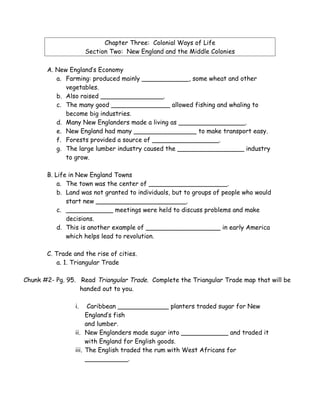Chapter 3 sec 2 Students Notes
- 1. Chapter Three: Colonial Ways of Life Section Two: New England and the Middle Colonies A. New England’s Economy a. Farming: produced mainly ____________, some wheat and other vegetables. b. Also raised ________________. c. The many good _______________ allowed fishing and whaling to become big industries. d. Many New Englanders made a living as _________________. e. New England had many ________________ to make transport easy. f. Forests provided a source of _________________. g. The large lumber industry caused the _________________ industry to grow. B. Life in New England Towns a. The town was the center of ____________________. b. Land was not granted to individuals, but to groups of people who would start new _______________________. c. ____________ meetings were held to discuss problems and make decisions. d. This is another example of ___________________ in early America which helps lead to revolution. C. Trade and the rise of cities. a. 1. Triangular Trade Chunk #2- Pg. 95. Read Triangular Trade. Complete the Triangular Trade map that will be handed out to you. i. Caribbean _____________ planters traded sugar for New England’s fish and lumber. ii. New Englanders made sugar into ____________ and traded it with England for English goods. iii. The English traded the rum with West Africans for ___________.
- 2. iv. The slaves were ______________ to the Caribbean and traded for sugar. v. Trade caused many merchants to become ____________ and large cities grew. b. 2. New England Society i. Wealthy merchants – controlled ________________. ii. Artisans- _____________ workers. Examples: carpenters, blacksmiths iii. Unskilled workers without ____________________ iv. ________________ servants and Africans. D. Society in the Middle Colonies a. ______________ was the main crop. b. In the early 1700s there was a huge wave of English ________________ to the Middle colonies. c. Demand for wheat _____________________. d. Caused the development of the ____________ system in the Middle Colonies. 1. Middle Colonies class system: i. Very wealthy who owned large ______________ or businesses. ii. _______________ farmers. iii. Poor with no __________________.

